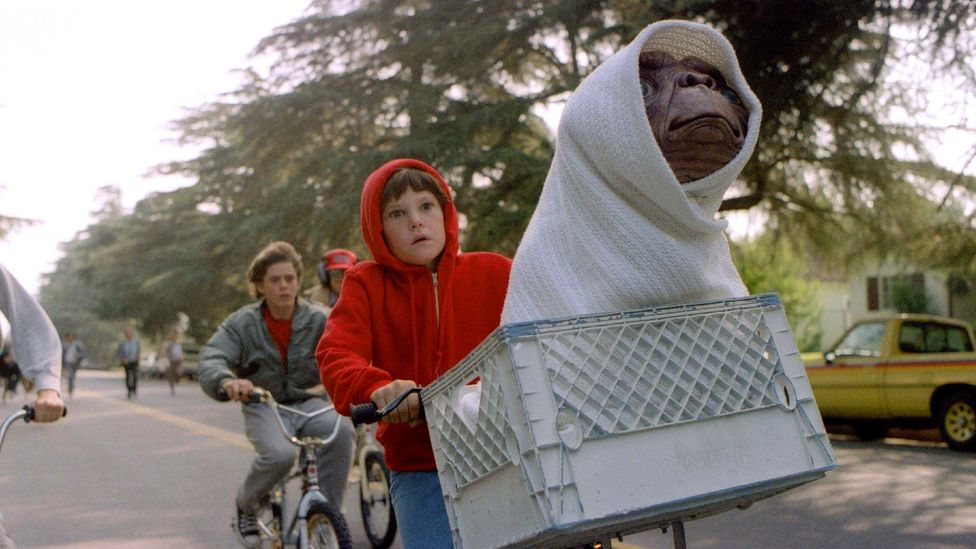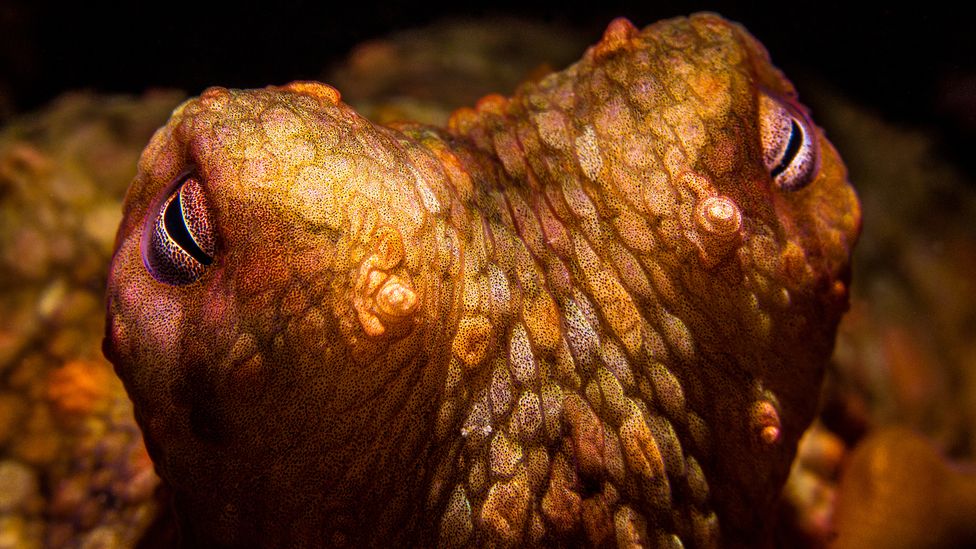Humans are still searching for signs of intelligent alien life on other planets - but how would we react towards it if we ever did make contact?
According to many of our cultural touchstones, there's only one thing for it if extraterrestrials ever take a cosmic detour to our planet: heavy artillery fire.
But from the sugary 1980s blockbuster ET the Extra-Terrestrial and the decades of Star Trek episodes to the books of Isaac Asimov and Ursula K Le Guin, science fiction writers have long wrangled with the question: how would we really treat them?
In popular culture, extraterrestrials are often cast as second-class citizens or less than human. If it weren't for the intervention of ET's human friend, the titular alien would have been cut open on an operating room table. In the 2009 film District 9, millions of alien "prawns" are packed into South African slums - an allegory for human bigotry and cruelty in real life.
Evidence of extraterrestrial life has not yet been found, although we are certainly looking for it. In any case, anything we find in the near future is more likely to consist of the signs of microbial life that may have once existed on Mars than the humanoids depicted in films and TV shows.
The Drake equation
In 1961, astrophysicist Frank Drake set out a formula to roughly estimate the number (N) of advanced, detectable civilisations likely to exist in the Milky Way galaxy:
N = R∗x fp x ne x fe x fi x fc x L where
R∗ = the rate of star formation in the Milky Way
fp = the fraction of those stars with planetary systems
ne = the average number of planets in each planetary system that can potentially support life
fe = the fraction of planets that could potentially support life which actually do
fi = the fraction of planets with life which develop intelligent life/civilisations
fc = the fraction of these civilisations which develop technologies with signs detectable in space
L = the length of time such civilisations release detectable signals into space
But according to the Drake equation, there's a decent chance, statistically speaking, that intelligent extraterrestrials are out there somewhere - even if the stars would have to align for us to find and contact each other, given the vastness of our galaxy and enormous distance between planets.
"Finding life or making contact is always going to be highly unlikely until the day we do [it]," says John Zarnecki, emeritus professor of space sciences at the Open University in the UK.
"It reminds me of exoplanets: as a young researcher, it was a topic we talked about, and we all suspected exoplanets were out there, but there was no way that we'd ever find one because it was technically far too difficult."
We now know exoplanets are out there, and some are even potential candidates for life because they host water.
So with the search ongoing for alien life and the possibility remaining that we encounter it, it's not amiss to consider how we might react if we ever did make contact - especially considering an intelligent alien species is likely to be very different to our own human one.
Non-human rights
Writers don't seem to have too much hope that humans would treat aliens very well. Perhaps that's because our track record of affording rights to the inhabitants of this planet, human or otherwise, has been so poor throughout history, despite the international legal conventions supposedly safeguarding them.
The granting of inalienable, universal rights - that is, the rights guaranteed to all people no matter what - were enshrined by the international community into law through the Universal Declaration of Human Rights in 1948 after the horrors of World War Two.
However, except for sanctions, there are limited means to enforce these rights even for humans. While these laws state that people are supposed to have rights like liberty and freedom from enslavement, afforded to each of us from birth to death, some political philosophers have suggested that in practice, these only really exist on paper.
If not for the intervention of ET's human friend, the titular alien would have been cut open on an operating room table (Credit: FlixPix/Universal Pictures/Alamy)
A clue for how we might treat aliens we ever do have contact with may lie in the rights we've afforded non-human species on our planet. Although many countries now recognise animals ranging from gorillas to crows as sentient, it's only recently that animal rights groups have made some legal headway in affording "rights" to animals based on this sentience - loosely defined as their ability to experience comfort or distress.
We search the Universe to discover ourselves, because it forces us to reflect back on how we relate to each other, how we relate to our environment, and how we relate to other species and people - Jill Stuart
Some ethicists are already considering how the rights of a completely unfamiliar alien species would fit into our legal and ethical frameworks. But there's been little in the way of open international discussion around aliens. A question was raised at a United Nations General Assembly session in 1977 by the prime minister of Grenada, Eric M Gairy, who believed UFO sightings may have been signs of hostile extraterrestrial life on our planet, and suggested establishing an official investigation body through the UN. But no policy was adopted, and he was pressed to drop the topic by British diplomats, before being deposed in a coup the following year.
Some governments are taking an interest though. Back in 1999, journalist Leslie Kean was leaked a French dossier on UFOs showing generals and admirals believed the unexplained phenomena could potentially be extraterrestrial. Earlier this year, for the first time in decades, the US Congress publicly debated what to do about these mysterious flying objects, although there's no evidence they're of extraterrestrial origin.
You might also like:
- Could humans have contaminated Mars with life?
- Is the UK poised to return to space launches?
- The mysterious inner life of the octopus
Jill Stuart, a specialist in outer space law at the London School of Economics, doesn't believe that humans will make contact with extraterrestrials within our lifetimes. But she still thinks considering what we would do in this situation is a conversation worth having.
"We search the Universe to discover ourselves, because it forces us to reflect back on how we relate to each other, how we relate to our environment, and how we relate to other species and people," she says. "These future-focused scenarios may never happen, but the whole process has value in and of itself."
A missing plan
There are no international agreements or mechanisms in place for how humanity would handle an encounter with extraterrestrial intelligence, says Niklas Hedman, executive director of UN Office for Outer Space Affairs (Unoosa). That's not to say a framework could never exist. The UN, as the "prime global intergovernmental organisation", would be a fit for such mechanisms, he adds, but ultimately action and debate "boils down to the will of member states".
An artist's concept of Kepler-1649c, an Earth-sized exoplanet orbiting within the habitable zone of the star Kepler-1649 (Credit: NASA/Ames Research Center/Daniel Rutter)
Currently, all international space law relates to human activity, says Hedman. The first Outer Space Treaty was signed through the UN in 1967 by the UK, the Soviet Union, and the US, in response to the development of intercontinental ballistic missiles, which could reach targets in space. It serves as the basis for all existing space law, which has developed over time as new possibilities and concerns around space emerged.
All five of the major space treaties - which now cover everything from the prohibition of weapons through to liability for damage and debris from spacefaring nations - centre around what humans do in space and how this affects other humans.
The Search for Extraterrestrial Intelligence group at the International Academy of Astronautics did adopt a post-detection framework in 2010, building on decades of prior debate. In the case of any detection of signals from intelligent extraterrestrial life, this recommends creating a forum for international coordination through the UN and its Committee on the Peaceful Uses of Outer Space (Copuous).
Stuart believes it's unlikely any widely accepted international framework will be developed until it needs to be. People like having material, real-life scenarios to consider in order to bring new ideas into law. Should contact happen, it's possible that the existing legal frameworks that govern human rights could be extended and adapted to those of aliens.
One major consideration in this case would be the intent of the aliens: in short, whether they were benign or hostile. This feeds into the debate over whether we should actively be attempting to contact extraterrestrials, or passively looking for signals of their existence, Stuart says - an ongoing contentious question amongst space experts.
When it comes to aliens, we have to ask: what kind of intelligence do they have? Why do they have it? - Susan Blackmore
So what would happen if a flying saucer suddenly crash-landed somewhere on Earth? No protocols have been set out or even suggested, but hypothetically, it's possible that the country it landed in would find itself having to lead initial discussions for how to respond, says Stuart.
"There wouldn't be any precedent or legal background for there to be responsibility," Stuart says, adding that if a UFO had been shot down and landed in a nation state, there may be a case that the country should take responsibility for the fallout.
In a 2011 paper for The Royal Society on "supra-Earth affairs", former Unoosa director Mazlan Othman proposed that the interest of countries in combating the dangers of near earth objects - ie asteroids - could offer a model for international cooperation if the existence of extraterrestrial life or intelligence is ever established.
With little in the way of agreed principles about how we would collectively treat any extraterrestrials we encounter, one approach could be simply applying the rights granted to humans. Fitting this into the existing legal framework would make sense, says Stuart.
It's a reasonable assumption that any species that could travel to Earth would be of a high level of intelligence and sentience, and therefore should be treated akin to humans. This could support a case for "human rights" to evolve into "sentient rights".
Considering octopuses can be a first step to imagining how intelligent extraterrestrial life could be different from human intelligence (Credit: Douglas Klug/Getty Images)
We would also need to take into account the various types of possible intelligence and sentience. Even on our own planet, there are all sorts of intelligences we are only just coming to recognise. The debate continues over whether octopuses, long famous for their intelligence, also have consciousness and can feel pain. The growing practice of mycology, meanwhile, indicates that some fungi show aspects of intelligence, such as having a capability to learn and engage in decision-making.
"When it comes to aliens, we have to ask: what kind of intelligence do they have?" says Susan Blackmore, a writer and visiting professor at the University of Plymouth in the UK, who researches consciousness. "Why do they have it? I think we must assume these aliens would have evolved by Darwinian evolutionary processes, because that's the only process we know that will produce living intelligent things."
Alien sentience
In a recounting of a supposed alien encounter in Varginha, Brazil, set out in the 2022 UFO documentary Moment of Contact, a story is told about a mysterious creature claimed to have been found near a crash site clearly in some kind of physical pain. Whatever you think of the sighting, it could be a capacity for pain and suffering that might better guide our approach to affording rights to any visitors from other worlds.
"Could aliens suffer?" Blackmore asks. "If so, we should have some moral obligation towards [them], and perhaps even build legal frameworks on the basis of [this]."
A lot would depend on the cognitive capacities of the extraterrestrials, which may be far more advanced than those of dolphins, or humans, for that matter - Peter Singer
The ethicist Peter Singer, who has written on the subject of inalienable rights for extraterrestrials as well as animals, says that sentience would ultimately be the key consideration.
"Assuming that the extraterrestrial being is sentient, in the sense capable of experiencing pain and pleasure, and has other desires and interests that it may take us some time to ascertain, the fundamental ethical principle we should apply is equal consideration of similar interests," he says.
This term, based on a concept set out by Singer back in 1979, means that all beings capable of enjoyment or suffering deserve to have their interests equally taken into account in any moral decision that affects them. "In other words, the pain of an extraterrestrial counts as much as the pain of an Earthling."
The difficult issue here would be establishing what interests the extraterrestrials had, he adds. "A lot would depend on the cognitive capacities of the extraterrestrials, which may be far more advanced than those of dolphins, or humans, for that matter - and if they are far more advanced than our own, we may not be able to grasp what they are."
In the case of finding multicellular organisms on another planet, provided they are moving, it's a good bet they are intelligent and sentient, says Lori Marino
The Nonhuman Rights Project, a US organisation which aims to secure rights for nonhuman animals, believes the starting place for these rights is autonomy, a concept valued in US courts which means an individual has the ability to choose what to do, where to go, how to act, and memory of events that have previously occurred. Consciousness, meanwhile, is far too broad a category to serve as a legal criterion for rights, because no one agrees on what it actually is.
"Today, at least in the United States, every human is born with the inalienable right to liberty, but it wasn't always the case that all humans had that right," says Jake Davis, attorney at the Nonhuman Rights Project. "It took many years, it took a civil war, and an immense amount of struggle for every human to be put on equal footing as far as the right to bodily liberty and integrity goes.
"My wish is that if an extraterrestrial species reached out to us, and they weren't hostile, that we wouldn't just assume that they are like nonhuman animals - things with which we could do whatever we wanted, because we are human, and they are not. My wish would be that we would evaluate them as peers to the extent that they show those capabilities [such as autonomy] and go from there."
In the fictional world of Star Trek, the Prime Directive prohibits interference with the natural development of alien civilisations (Credit: Paramount/Allstar/Alamy)
According to Lori Marino, a former director at the Nonhuman Rights Project, even intelligence and sentience are difficult concepts for experts to agree on. "They are both fuzzy concepts," she says. "But I would feel confident saying intelligence is how one processes information and sentience is the ability to feel and be aware of feeling."
In the case of finding multicellular organisms on another planet, provided they are moving, it's a good bet they are intelligent and sentient, she argues. They would need some form of intelligence in order to exist at all, she suggests. "We should make the assumption that they are sentient and, therefore, capable of suffering, and leave them alone. Of course I am not so naïve to think we will, but that is morally what we should do."
The idea that humans should ourselves avoid interfering with the natural development of alien civilisations itself has a long history in science fiction, such as in Star Trek's "Prime Directive" - although in this fictional world, the principal can be overridden if the alien species is deemed too dangerous. Similar ideas are already considered in our own world today, however - Nasa's Office of Planetary Protection, for example, aims to protect both explored planets and Earth.
If aliens can make it to our planet, though, perhaps it's not their rights we should be worrying about.
If they arrive, personally, I'm going to buy a lot of frozen pizza and head for the hills - Seth Shostak
Seth Shostak, senior astronomer for the Seti Institute, a non-profit research organisation which aims to understand and explain the origin and nature of life in the Universe, is optimistic for some contact in our lifetime. But it's important to differentiate between two kinds of contact, he says.
It's more likely that we would receive signs and signals from technologically advanced civilisations than receive an alien visit. If we received signs, there would not be any great urgency, because any signal we do send would take so long to arrive that we'd have plenty of time to be deliberate about what we say back.
An alien visit, however, would mean the alien civilisation has access to technology far beyond what we're capable of. When ET's pals at last pick up the hapless creature at the end of the blockbuster, they probably could have obliterated Earth on their way back "home", if they had had the inclination.
"If they arrive, personally, I'm going to buy a lot of frozen pizza and head for the hills," says Shostak. "If they can get here, as opposed to transmitting a message, they are more advanced than we are by an enormous margin."
In this case, a more appropriate question might be: would our new alien overlords afford us rights?
"What are you going to do if they're aggressive?" asks Shostak. "It'd be like Neanderthals trying to meet with the US Air Force: the Neanderthals could have all the policies they want, but it wouldn't matter."
-- Join one million Future fans by liking us on Facebook , or follow us on Twitter or Instagram.
If you liked this story, sign up for the weekly bbc.com features newsletter , called "The Essential List" - a handpicked selection of stories from BBC Future , Culture , Worklife , Travel and Reel delivered to your inbox every Friday.



